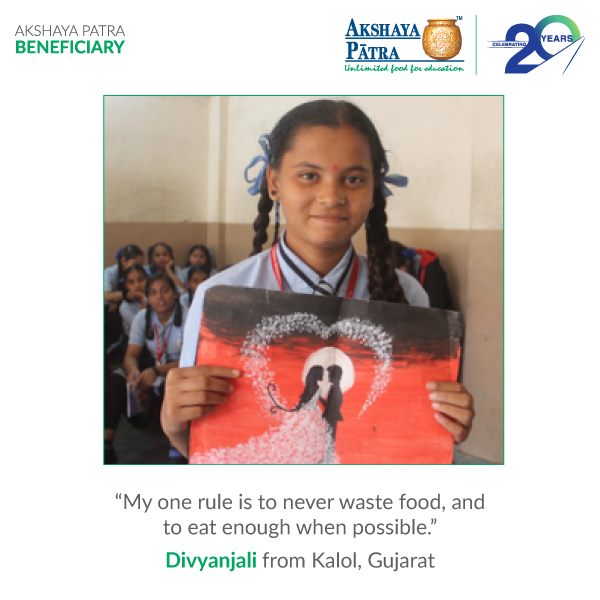Imagine a serene life where one is neither influenced by the lifestyle of cities and towns nor has continuous access to the bare necessities like electricity and water. To express gratitude towards your parents’ struggles to provide you with nothing but the best, you think to yourself, “I will study hard, work hard and give the best life my parents deserve!”

This is a similar story of Divyanjali, a Mid-Day Meal Programme beneficiary, who wants to become a famous painter like India’s Raja Ravi Varma, to take care of her parents who skip eating meals to make ends meet so that she can pursue her studies.
Mid-day meals are an intervention to bring children to school every day. There are around 120 million children who receive school lunch as a part of the Government’s Mid-Day Meal Scheme in India. Most of these children are willing to go to school only for a major reason: to get free unlimited meals that they otherwise may not be able to afford.
How did the Mid-Day Meals Scheme start in India
The history of the Mid-Day Meal Programme dates back to the pre-independence era when the British colony introduced mid-day meals in 1925. This was followed by the French administration in Puducherry in 1930. From the years 1962-1963, this scheme was introduced in Tamil Nadu, Gujarat, Kerala and the rest of the states. By 1991, 12 states were implementing the programme.
In 1995, the Mid-Day Meal Scheme was officially launched in India to provide nutritious meals to children. In 2001, the Supreme Court of India mandated that students of Government and Government-aided schools should be provided with mid-day meals.
Objectives of the Mid-Day Meals Programme
- Protecting children from classroom hunger that restricts their ability to focus in class
- Improving the nutritional status of children in Government and Government-aided schools.
- Increasing attendance rates and enrolment rates in schools
- Encouraging children to socialise regardless of caste or creed
- Creating employment opportunities for women
Many NGOs partnered with the Government of India to facilitate the elimination of classroom hunger. The Akshaya Patra Foundation is one such non-profit organization that has been serving school meals since 2000 and is recognized as the world’s largest NGO-run school meal programme.
According to the UNESCO Institute of Statistics, 2.8 million children between the ages 6-13 years, do not go to school. In such a situation, free and unlimited meals act as a potential incentive for them to attend school. Akshaya Patra aims to support more such children from challenging backgrounds. Its vision is to provide unlimited food for education to 5 million children every day by 2025.
Even in the UK, Akshaya Patra has opened up a state-of-the-art kitchen that can feed up to 9000 children/people in a day. Know more about OUR WORK IN THE UK
Donate online to be a part of Akshaya Patra’s mission to change the lives of children.
